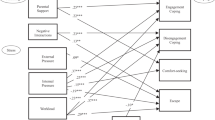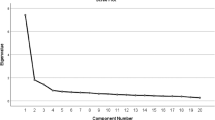Abstract
To address the role of gender, social support, and age in coping among Arab adolescents in Jordan. A cross-sectional correlational design was used. The sample included 474 adolescents aged 11–18 years old from five public, four private, and two UNRWA United Nations Relief and Works Agency schools. Perceived Social Support (PSS) Scale and Coping Response Inventory-Youth were used to collect data. Descriptive statistics, T-test, one-way ANOVA, two-way ANOVA, and Pearson correlation were used to analyze data. Among approach coping strategies, positive reappraisal was used the most (M = 15.05, SD = 4.21), and seeking guidance and support was used the least (M = 13.61, SD = 4.18). Among avoidance coping strategies, seeking alternative rewards was used the most (M = 14.96, SD = 4.03), while cognitive avoidance and acceptance or resignation were used the least (M = 13.98, SD = 3.77). Girls used avoidance and approach coping strategies at higher levels than boys. Significant interactions were found in seeking alternative rewards, positive reappraisal, and logical analysis according to age and gender. Adolescents used approach and avoidance coping with almost equal levels. However, girl adolescents used approach and avoidance coping at higher levels than boys. Significant differences were found in coping strategies according to social support.



Similar content being viewed by others
Data Availability
The datasets generated during and/or analyzed during the current study are not publicly available because it is confidential but are available from the corresponding author on reasonable request.
References
Alfoukha, M. M., Hamdan-Mansour, A. M., & Banihani, M. A. (2019). Social and psychological factors related to risk of eating disorders among high school girls. The Journal of School Nursing, 35(3), 169–177.
Al-Yateem, N., Subu, M. A., Al-Shujairi, A., Alrimawi, I., Ali, H. M., Hasan, K., et al. (2020). Coping among adolescents with long-term health conditions: A mixed-methods study. British Journal of Nursing, 29(13), 762–769.
Arabiat, D. H., Shaheen, A., Nassar, O., Saleh, M., & Mansour, A. (2018). Social and health determinants of Adolescents' wellbeing in Jordan: Implications for policy and practice. Journal of Pediatric Nursing, 39, 55–60.
Cicognani, E. (2011). Coping strategies with minor stressors in adolescence: Relationships with social support, self-efficacy, and psychological well-being. Journal of Applied Social Psychology, 41(3), 559–578.
Cohen, S., & Wills, T. A. (1985). Stress, social support, and the buffering hypothesis. Psychological Bulletin, 98(2), 310–357.
Ebata, A. T., & Moos, R. H. (1991). Coping and adjustment in distressed and healthy adolescents. Journal of Applied Developmental Psychology, 12(1), 33–54.
Eschenbeck, H., Kohlmann, C.-W., & Lohaus, A. (2007). Gender differences in coping strategies in children and adolescents. Journal of Individual Differences, 28(1), 18–26.
Hamdan-Mansour, A. M., & Dawani, H. A. (2008). Social support and stress among university students in Jordan. International Journal of Mental Health and Addiction, 6(3), 442–450.
Hamdan-Mansour, A. M., Kim, Y., Puskar, K., & Amer, H. M. (2008). Psychometric qualities of the coping response inventory-youth form. Issues in Mental Health Nursing, 29(4), 371–385.
Hamdan-Mansour, A., Al-Sagarat, A., Shehadeh, J., & Al Thawabieh, S. (2020). Determinants of substance use among high school students in Jordan. Current Drug Research Reviews.
Harazneh, L., Hamdan-Mansour, A. M., & Ayed, A. (2020). Resiliency process and socialization among Palestinian children exposed to traumatic experience: Grounded theory approach. Journal of Child and Adolescent Psychiatric Nursing.
Kira, I. A., Alawneh, A.-W. N., Aboumediene, S., Lewandowski, L., & Laddis, A. (2014). Dynamics of oppression and coping from traumatology perspective: The example of Palestinian adolescents. Peace and Conflict: Journal of Peace Psychology, 20(4), 385–411.
Kirchner, T., Forns, M., Amador, J. A., & Muñoz, D. (2010). Stability and consistency of coping in adolescence: A longitudinal study. Psicothema, 22(3), 382–388.
Lakey, B., & Orehek, E. (2011). Relational regulation theory: A new approach to explain the link between perceived social support and mental health. Psychological Review, 118(3), 482–495.
Lazarus, R. S., & Folkman, S. (1987). Transactional theory and research on emotions and coping. European Journal of personality, 1(3), 141–169.
Low, N. C., Dugas, E., O’Loughlin, E., Rodriguez, D., Contreras, G., Chaiton, M., & O’Loughlin, J. (2012). Common stressful life events and difficulties are associated with mental health symptoms and substance use in young adolescents. BMC Psychiatry, 12(1), 1–10.
Magai, D. N., Malik, J. A., & Koot, H. M. (2018). Emotional and behavioral problems in children and adolescents in Central Kenya. Child Psychiatry & Human Development, 49(4), 659–671.
Mathew, A., & Nanoo, S. (2013). Psychosocial stressors and patterns of coping in adolescent suicide attempters. Indian Journal of Psychological Medicine, 35(1), 39–46.
Michou, A., Mouratidis, A., Ersoy, E., & Uğur, H. (2016). Social achievement goals, needs satisfaction, and coping among adolescents. Personality and Individual Differences, 99, 260–265.
Ministry of Education. (2010). System of Education in the Hashemite kingdom of Jordan. from http://www.moe.gov.jo/MenuDetails.aspx?MenuID=91. Accessed 28 Mar 2019
Moos, R. H. (1993). Coping responses inventory youth form: Professional manual: Psychological Assessment Resources.
Obermeyer, C. M. (2015). Adolescents in Arab countries: Health statistics and social context. DIFI Family Research and Proceedings, 2015(1), 1.
Procidano, M. E., & Heller, K. (1983). Measures of perceived social support from friends and from family: Three validation studies. American Journal of Community Psychology, 11(1), 1–24.
Raheel, H. (2014). Coping strategies for stress used by adolescent girls in Riyadh, Kingdom of Saudi Arabia. Pakistan Journal of Medical Sciences, 30(5), 958–962.
Samara, M., Hammuda, S., Vostanis, P., El-Khodary, B., & Al-Dewik, N. (2020). Children’s prolonged exposure to the toxic stress of war trauma in the Middle East. bmj, 371.
World Health Organization. (2010). Stages of Adolescent Development. from https://apps.who.int/adolescent/second-decade/section/section_2/level2_2.php. Accessed 28 Mar 2019
World Health Organization. (2020). Adolescent mental health. from https://www.who.int/mental_health/maternal-child/adolescent/en/. Accessed 28 Mar 2019
Yoo, C. (2019). Stress coping and mental health among adolescents: Applying a multi-dimensional stress coping model. Children and Youth Services Review, 99, 43–53.
Acknowledgments
The authors are grateful to the Deanship for Scientific Research- The University of Jordan- for funding this study.
Funding
This research was funded by deanship of scientific research at the University of Jordan.
Author information
Authors and Affiliations
Corresponding author
Ethics declarations
• The protocol for the research project has been approved by the Ethical Committee at the University of Jordan and it conforms to the provisions of the Declaration of Helsinki in 1995 (as revised in Edinburgh 2000).
• The researchers obtained informed consent from study participants.
Conflict of Interest
The authors declare that they have no conflict of interest to disclose.
Authorship Statement
I confirm that the authors meet the authorship and are in agreement with the content of the manuscript.
Additional information
Publisher’s Note
Springer Nature remains neutral with regard to jurisdictional claims in published maps and institutional affiliations.
Rights and permissions
About this article
Cite this article
Alkaid Albqoor, M., Hamdan, K.M., Shaheen, A.M. et al. Coping among adolescents: Differences and interaction effects of gender, age, and supportive social relationships in Arab culture. Curr Psychol 42, 9071–9079 (2023). https://doi.org/10.1007/s12144-021-02179-4
Accepted:
Published:
Issue Date:
DOI: https://doi.org/10.1007/s12144-021-02179-4




